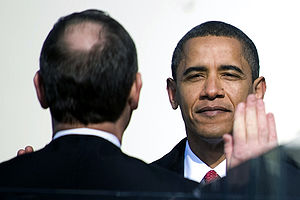Obama’s Disdain For The Constitution Means We Risk Losing Our Republic
< < Go Back
 Since President Obama signed the Affordable Care Act into law, he has changed it five times. Most notably, he suspended the employer mandate last summer. This is widely known, but almost no one seems to have grasped its significance.
Since President Obama signed the Affordable Care Act into law, he has changed it five times. Most notably, he suspended the employer mandate last summer. This is widely known, but almost no one seems to have grasped its significance.
The Constitution authorizes the President to propose and veto legislation. It does not authorize him to change existing laws. The changes Mr. Obama ordered in Obamacare, therefore, are unconstitutional. This means that he does not accept some of the limitations that the Constitution places on his actions. We cannot know at this point what limitations, if any, he does accept.
By changing the law based solely on his wish, Mr. Obama acted on the principle that the President can rewrite laws and—since this is a principle—not just this law, but any law. After the crash of Obamacare, many Congressmen have implored the President to change the individual mandate the same way he had changed the employer mandate, that is, to violate the Constitution again.
The main responsibility the Constitution assigns to the President is to faithfully execute the Laws. If the President rejects this job, if instead he decides he can change or ignore laws he does not like, then what?
The time will come when Congress passes a law and the President ignores it. Or he may choose to enforce some parts and ignore others (as Mr. Obama is doing now). Or he may not wait for Congress and issue a decree (something Mr. Obama has done and has threatened to do again).
Mr. Obama has not been shy about pointing out his path. He has repeatedly made clear that he intends to act on his own authority. “I have the power and I will use it in defense of the middle class,” he has said. “We’re going to do everything we can, wherever we can, with or without Congress.” There are a number of names for the system Mr. Obama envisions, but representative government is not one of them.
If the President can ignore the laws passed by Congress, of what use is Congress? The President can do whatever he chooses. Congress can stand by and observe. Perhaps they might applaud or jeer. But in terms of political power, Congress will be irrelevant. Probably, it will become a kind of rubber-stamp or debating society. There are many such faux congresses in tyrannies throughout history and around the globe.
– Ignoring two centuries of practice, President Obama made four recess appointments in January 2012, when the Senate was not in recess. Three courts have found that his appointments were unconstitutional, and the Supreme Court has agreed to take up the case. If the Supreme Court finds against him, what will Mr. Obama do?
– The Attorney General’s Office is the branch of government charged with enforcing federal laws. After the Supreme Court struck down the key provision of the Voting Rights Act of 1965, Attorney General Holder announced that he would use other provisions of the act to get around the Court’s decision.
– The Supreme Court has defined the standard for sexual harassment as “severe, pervasive, and objectively offensive” behavior to a “reasonable person.” In open defiance of that ruling, the Obama Department of Education has declared a new definition of sexual harassment for colleges, that is, “any unwelcome conduct of a sexual nature,” including “verbal conduct,” even if it is not objectively offensive—thus reinforcing the reign of terror over sex on college campuses. If a young man’s request for a date turns out to be unwelcome, he is guilty of sexual harassment by definition.
The shocking fact is that our whole system of representative government depends on it being led by an individual who believes in it; who thinks it is valuable; who believes that a government dedicated to the protection of individual rights is a noble ideal. What if he does not?
More From Forbes:



